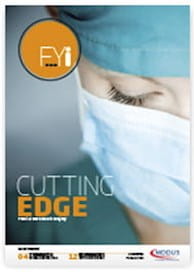
DOCTORS should all be aware of their privileged position in society. There are few professions in which you can question an individual on the most personal aspects of their life, let alone examine them or perform invasive procedures. People, or more specifically patients, allow their doctors this liberty in order to receive appropriate treatment. In return they trust doctors not to abuse their position. And therein lies the cornerstone of any doctor-patient relationship: trust.
A friend in need
Any doctor would help a stranger on the street suffering a medical emergency and MDDUS provides access to indemnity for such "good Samaritan acts". However, what do you do when the situation is not as clear?
Consider the scenario. A friend meets you as your Friday night shift is ending. They are going on holiday on Monday and forgot to pick up a repeat prescription for their thyroxine medication, which will now run out during the trip. Their practice is closed for the weekend so they ask you to write a prescription to cover them. What should you do?
The GMC states you should, wherever possible, avoid providing medical care to someone close to you unless in an emergency. But does this scenario qualify as an emergency? After all, your friend is unable to collect their prescription before going on holiday so it is an urgent situation for them. Or perhaps you could argue they are just a friend and not "someone close to you"? If you are going to prescribe how would you do it – can you use a hospital prescription pad because they are entitled to NHS treatment?
Is it ever appropriate to become romantically involved with a patient, either past or present?
Although one or more of the arguments above may seem persuasive, the GMC’s guidance does start by saying "wherever possible", implying that you need to exclude all the other possibilities before you make a decision to treat or prescribe. In this case there are lots of other options available. For example, your friend could attend one of the many walk-in centres in the UK that open at weekends. Or they could see a doctor in the country they are visiting and obtain a local prescription. By prescribing, in this case, you are likely not only to fall foul of the GMC’s guidance, but also your own Trust/health board’s prescribing policy and the restrictions within it.
A friend request
When it comes to maintaining boundaries, another important risk area is social media. Patients can often form close bonds with their doctor and many are tempted to look them up on Facebook and may even send a friend request. So what do you do if you receive one from a patient? Is it okay to accept? Or should you decline and potentially face awkward moments as you continue to manage their care?
If you feel declining a friend request may be awkward, imagine how you would feel knowing they had seen your personal photos and details of your friends and family. Or that they had read personal comments you had written or received. Would you feel as able to discuss treatment plans or difficult decisions with them? Do you think it would impact the level of professional trust between you?
The GMC’s guidance Doctors’ use of social media advises that using social media creates risks, "particularly where social and professional boundaries become unclear." It goes on: "If a patient contacts you about their care or other professional matters through your private profile, you should indicate that you cannot mix social and professional relationships and, where appropriate, direct them to your professional profile."
In the case described here, MDDUS would recommend that you decline the friend request and, if the matter is raised by your patient, politely explain the importance of maintaining a professional relationship. If they persist in seeking to engage with you through social media it may be helpful to get the support of your senior colleagues. As with nearly all difficult situations, it is also essential you keep a clear record of everything that is happening at the time it happens.
There are steps you can take to minimise the chances of patients contacting you via social media. Take a good look at your privacy settings to make your profile as secure as possible, and try to keep a clear line between your professional and personal pages.
More than a friend
Another common dilemma is whether it is ever appropriate to become romantically involved with a patient, either past or present.
As highlighted at the outset, trust is the foundation of any doctorpatient relationship. The GMC is clear that a personal relationship with a current patient is never acceptable. Doctors must never use their professional position to pursue a sexual or improper emotional relationship with a patient or someone close to them. Their guidance Maintaining a professional boundary between you and your patient also states you must not end your professional relationship with a patient solely to pursue a personal relationship with them.
But is it ever appropriate to become involved with former patients? There are no answers or set time limits in such situations and doctors must always exercise their judgement. The GMC explains that the more recently a professional relationship with a patient ended, the less likely it is that beginning a personal relationship with that patient would be appropriate. The duration of the professional relationship may also be relevant. For example, a relationship with a former patient you treated over a number of years is more likely to be inappropriate than a relationship with a patient with whom you had a single consultation. Much also depends on whether there could be any perceived abuse of position. Factors which you would need to consider include the amount of time since you last saw the patient in a consultation, whether they are vulnerable, and whether you are still treating their family members.
It may be helpful to take a step back and think of how someone looking at your situation for the first time would judge it. If you think they may frown upon your actions, or you find yourself acting in a manner to conceal them, it may be time to take a second look.
Dr Naeem Nazem is a medical adviser at MDDUS and editor of FYi
This page was correct at the time of publication. Any guidance is intended as general guidance for members only. If you are a member and need specific advice relating to your own circumstances, please contact one of our advisers.
Read more from this issue of FYi

Save this article
Save this article to a list of favourite articles which members can access in their account.
Save to library
